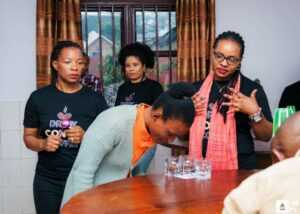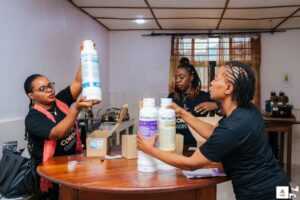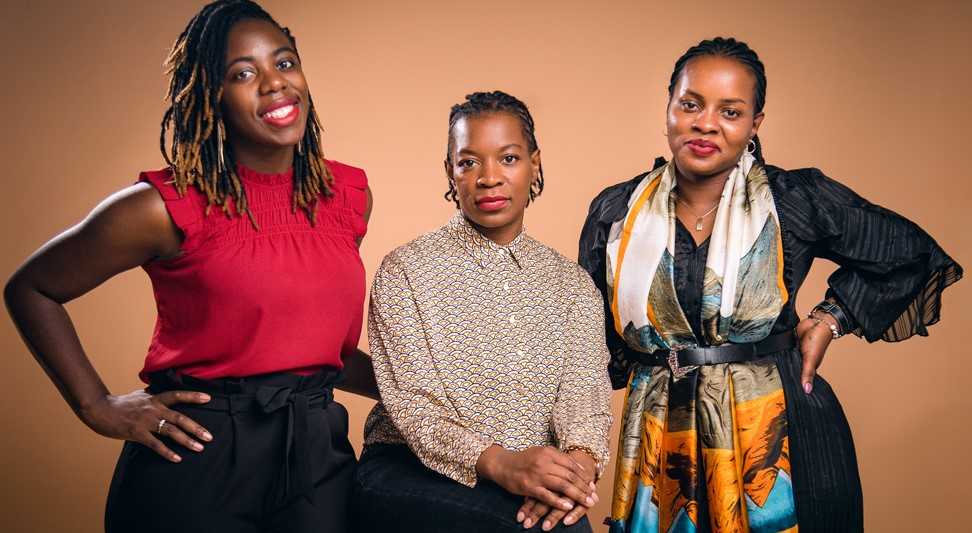MILAN – Fatuma Lokembo, the founder of the congolese specialty green coffee importer – mainly from the congolese republic -, Kiziwa Coffee – a word that means quiet water of the lake where usually coffee grows -, based in Dubai but very active in this african country among all farmers in there.
The final mission: to make the excellence of congolese coffee well known in the world and to improve the quality of the raw material at the same time, through education, learning and sharing new best practices among the farmers.
All this premises and goals spoken, have been illustrated during the four days conference in Bukavu to present Drink Congo Coffee Tour, an organization that aims at changing the narrative around Congolese Specialty Coffee, created by the strenght and the combined vision of three women: Fatuma Lokembo, Founder of Kiziwa Coffee (Dubai, UAE), Déborah Kabwang, Founder of Kanfuela Kaffé (Phoenix, AZ/USA), Linda Mugaruka, Founder of Yetu Qahwah (Bukavu, D.R. Congo)
But even before that long meeting, in this journey of added value, Fatuma has met other professionists who have supported her and her company to grow the project at the origins: Davide Spinelli, Renata Zanon, with the engagement of BWT Italia, have been involved in a course with the focus on the importance of water along every step of the supply chain, from the field to the brewing.
How did Drink Congo Coffee begin?
Fatuma Lokembo: “I was selling green beans from Congo to Dubai when I connected to a roaster in Phoenix Arizona, Deborah, whith whom I shared the same vision of congolese coffee: we were trying to see how to sell it more and how the people see this products from outside. She already knew Linda, a Q Grader based in Congo, and also with her we set the same goals.
We told ourselves: let’s do something for our Country and for the farmers, because it’s really hard for them to sell their coffee and it’s hard to me to get it too. Every time people taste it and they like it, but at the end they don’t buy it. They find it too much expensive. So we needed to make effort to see if in Congo was possible to lower the price for importation.
And then we wanted to go further: we wanted to understand why people don’t trust congolese coffee. They like it but they don’t buy it. So how can we make it happen? Talking about that, making people understand the hard work behind the coffee.
We thought: let’s find people from other countries to let them see how people is working in Congo and to teach farmers to be excellent and to grow better coffee.

We had the idea to keep classes with people that have experience in the coffee business. We needed someone people could deeply trust in, and than someone else to spread the word. Giving advices, informations that farmers don’t normally have.
The classes usually are too expensive for farmers and they can’t afford it. So we choose people that are able to give back: we make sure that the partecipants can write, they can then speak and explain to others in the local language what they have learnt.
At the water course, there were 26 partecipant but a lot of people had loved to come. Unfortunately the lab was too small: that’s why we have the plan to build another one with the project Drink Coffee in Congo. At least we will have two places where people could come and have classes.
Our goal is to involve congolese people along the chain: in this way we will help the community selling the coffee at a lower price.”
Renata Zanon: “Before knowing Fatuma, I realised that I’ve never tasted a specialty coffee from Congo in my life. That’s because congolese coffee has several issues: to export coffee from the plantation to the port of another country, you have to pay a lot of money to people that are stopping you on the road and asking you money to cross that path.
So the price of congolese coffee icreases even before it reaches the borders of other african countries: they need to cross another country to arrive to the sea – Congo has no step in the sea-. That’s the reason why congolese coffee goes into the black market or in Rwanda where it’s sold as their coffees. So that’s why nobody knows congolese coffee.
And usually when congolese coffee used to arrive to Europe, it was not a good one at the beginning, because the samples that were sent to the roaster, were not the same coffee that then the roaster found in the coffee bags. So the first thing we needed while selling the samples to the roasters was ensuring them that samples were the same ones taken out from the same bags.
So if the sample was for exemple 84 points, then they need to receive the same 84 points coffee in the bags. I engaged many people sending Fatuma’s samples and talking with coffee importers and roasters. But again, the price was not worth the quality of the coffee.
Indeed, Fatuma while exporting the coffee from Congo to Dubai, needs to pay a lot of money to make the coffee cross the country. At the time the coffee reaches Dubai and the storages, she has already spent a lot of money.
So we deicided first of all to talk about Congolese coffee, before then talking about Kiziwa Coffee. We tried to go to Congo in person, but the italian ambassador in there told me and Davide Spinelli not to go because it could be dangerous for us. But it wasn’t exactly the truth.”
Fatuma Lokembo: “It’s the way how Congo is perceived. People see pur nation but they don’t realise that it’s a big country and that we can not go in those areas that aren’t safe.”
Renata Zanon: “This is the reason why we really that coffee in Congo needs to be spoken about. People are only talking about the war and rebels.”
Fatuma Lokembo: “What people need to see is the citizens behind this war, they’re living, working, they’re making businesses in Congo. People want to make their country known not only for all the minerals, such as uranio sold in the black market. Let’s talk about what is good and what farmers are doing. Many of them have a lot of coffee that they can’t sell.
The only one that they are selling is the coffee for people that come before the harvest. They go to see the farmers and ask them to pay the cherries before they are ready. They cross the border and they pay: if a lot of cherries go to the black market, then the ones left have a higher price to export.
We need to make farmers understand that they need to keep their cherries and then we need to make sure that they can sell them withouth failing them.”
What about the water course?
Renata Zanon: “People didn’t have any idea that the water could really affect the taste of the coffee, from the beginning.
We called Sergio Barbarisi from BWT Italia and we asked him to help Fatuma and the congolese community. Sergio agreed in investing a budget to

create and to fix the water in the lab. But of course that wasn’t enough. So we involved Davide Spinelli to give a three hours online course focusing on watere. It was in English and then Futuma translated in French.”
Davide Spinelli:”I taught them about water in every step of the supply chain, explaining them how clean water can change the taste of coffee. I tried not to go too deep, but then I realized many students were curious to know more and more.
I explained them how water can behave during harvesting, processing, and in the response of the specific profile you want to get in roasting. I could interact with the partecipants that were really involved and happy. They tasted the tap water and then the water in bottles and they were shocked by the differences between the two.
Of course for me the hardest part was teaching them online, because I prefer to look people into their eyes to see their surprise while discovering new things.
Once they learned, they understood the importance of the water’s quality to change the approach in their work.”
But how is water in Congo?
Fatuma Lukembo: “We can’t even tell what kind of water there is in Congo. We don’t have any data. We can taste the differences, but we will have to take samples of water to know how we can improve it. They asked me what kind of water we had to start from, but we can’t answer exactly, because we don’t have any information about it.”
Renata Zanon: “It was really hard to organize the slides of the course. Davide didn’t know where to start from since he didn’t know anything about african water in general. Tap water is safe in Europe, but we didn’t know the same about congolese water. It took him a couple of weeks to prepare that lesson withouth even knowing what does clean water mean in Congo. We are able only to know that the water they use in the farm to wash the cherries, was safe, because it comes from the deep inside of falds acquifers.
But when we did the experiments with tap water and bottle water in brewing, people were very surprised by the differences and they didn’t even think it could be possible.
Knowledge in general is what farmeres need: they need to know how to select the cherries not putting the difected beans in the bags, because they don’t know that the way they’re sourting the coffee could make the difference in the final cup yet.
We really need to make an impact in all the chain. Managing to have a great coffee will make people think to buy congolese coffee instead of ethiopian because it’s as good just the same. We have a chance.
A lot of the people that attended the courses will share the informations and the knowledge to all farmers. People don’t trust local certified trainer and that’s why we have to make come professionist to Congo from outside.
BWT also sent some water filters to Congo and we managed to fix them to finally have very good water into the lab! I was so happy to receive the filters from BWT Italia and I know they are very expensives: I’m really grateful.”
It’s a long process to do some improvements: the most difficult thing is to change the way of thinking, to stimulate the wish of making better coffee. But when people realize that satisfying the final customer is possible, we’re all able to change. If just one of the people that attended the courses will change his/her behavior, it will be a great improvement for all the people in the Country. Going step by step will make us grow”
The next steps
“We’re going to report what we’ve done until now, what the issues to solve are. In Goma there was the director of ONAPAC – organisation for coffee an others agricultural products – in Bukavu and he was willing to involve farmers in there in this project. But this organization takes a lot of time, energies and money from our private companies and we need to recover first. So I send this message: if you are a public organization, put things together and help people to feel safe, in process of payments, passports, logistics, travels and hosting. Help us with paperworks and budgets: if they want to do that, we need to work with the help of government for next times.”




















